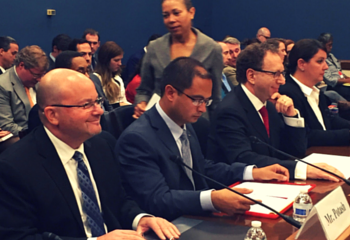By: Hannah Walker, Director of Government Relations, Food Marketing Institute

Today, the U.S. House of Representatives’ Small Business Committee held a hearing entitled, “The EMV Deadline and What it Means for Small Businesses: Part II.” If this sounds familiar, you are not suffering from déjà vu. The committee held “Part I” back on October 7th where Visa, the Electronic Payments Association (ETA), a banker and a credit union representative testified on EMV migration from the financial institutions’ perspective. See our previous blog post on this earlier hearing.
This time the panel consisted of four merchants and one witness depicting the consumer perspective. FMI was thrilled to have Art Potash with Potash Markets from Chicago, Illinois testify on our behalf to give the grocer’s perspective. Art is an active member of FMI; he sits on our Independent Operators Committee, is a member of our Board of Directors and has been an invaluable resource, especially during the height of our interchange lobbying battle. FMI also submitted a statement for the record and testimony.
Today’s hearing gave small merchants an opportunity to share their experiences migrating to EMV and the challenges they have faced along the way. Art had a unique perspective from the other retailers as he has the new EMV hardware in two of his stores and is waiting on his merchant acquirer to complete their backend upgrades so he can begin processing EMV transactions. Like everyone who is migrating to EMV, Art has invested significant resources in an effort to try and avoid additional fraud costs. He carefully pointed out that while banks had a clear incentive of enjoying lower fraud costs if they issued PIN cards, merchants had the threat of higher fraud liabilities if they didn’t upgrade.
Like the rest of the grocery industry, Art is fully PIN-enabled and accepts PIN transactions everyday with SNAP purchases and other government issued cards. He was able to counter the bank and card brand arguments against PIN-enabled cards here in the U.S. PIN is a tried and tested verification method that works. In Art’s testimony he was able to debunk some of the banks’ latest arguments against PIN, including that because it is a “static” number it is less safe than a biometric verification method like a thumbprint. In his testimony, he also showed how the card brands decided to abandon the chip and PIN solution they used everywhere else in the world and instead chose to use the untested “chip and choice” solution leaving American consumers and businesses unnecessarily vulnerable to preventable lost and stolen fraud.
While the House Small Business Committee does not have any pending legislation on EMV or other related payment issues, it was important that they hear from both sides of the EMV debate. By having the first panel include testimony exclusively from the financial sector, it gave merchants the unique opportunity to reply directly to each of their statements and claims. Today was an example that sometimes it is nice to have the last word.

 Industry Topics address your specific area of expertise with resources, reports, events and more.
Industry Topics address your specific area of expertise with resources, reports, events and more.
 Our Research covers consumer behavior and retail operation benchmarks so you can make informed business decisions.
Our Research covers consumer behavior and retail operation benchmarks so you can make informed business decisions.
 Events and Education including online and in-person help you advance your food retail career.
Events and Education including online and in-person help you advance your food retail career.
 Food Safety training, resources and guidance that help you create a company food safety culture.
Food Safety training, resources and guidance that help you create a company food safety culture.
 Government Affairs work — federal and state — on the latest food industry policy, regulatory and legislative issues.
Government Affairs work — federal and state — on the latest food industry policy, regulatory and legislative issues.
 Get Involved. From industry awards to newsletters and committees, these resources help you take advantage of your membership.
Get Involved. From industry awards to newsletters and committees, these resources help you take advantage of your membership.
 Best practices, guidance documents, infographics, signage and more for the food industry on the COVID-19 pandemic.
Best practices, guidance documents, infographics, signage and more for the food industry on the COVID-19 pandemic.
